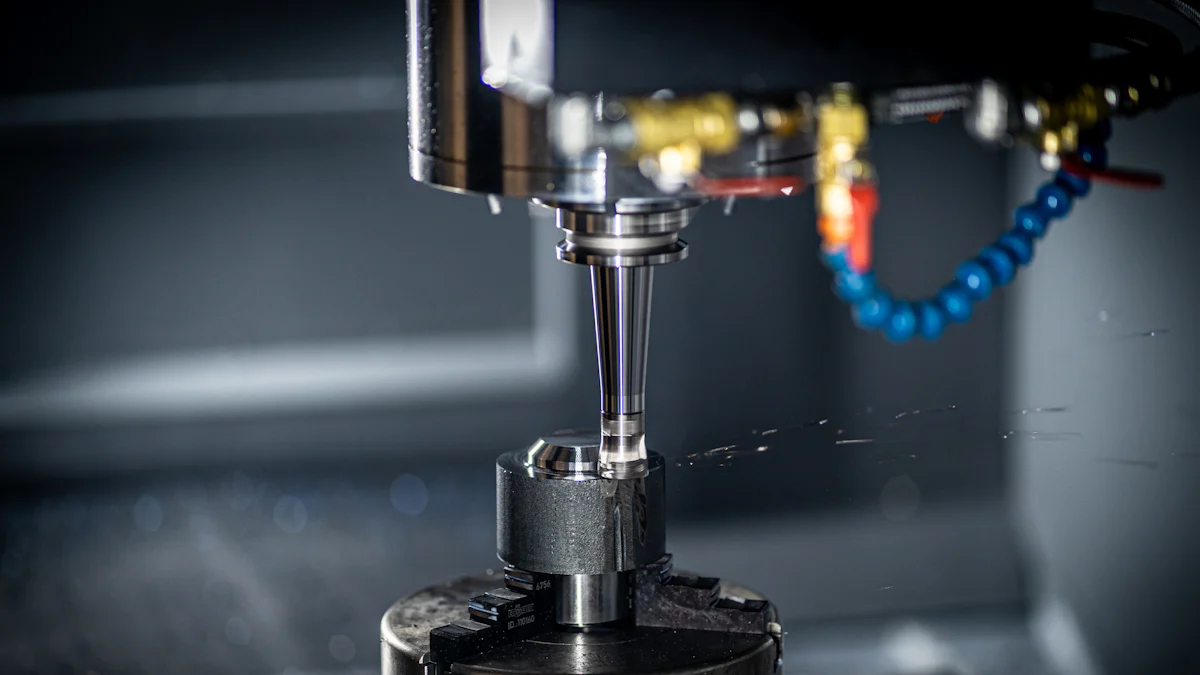The Impact of CNC Processing on Six Major Industries

The Impact of CNC Processing
CNC Processing in Automotive Industry
CNC processing has revolutionized the manufacturing landscape, particularly in the automotive industry. The precision engineering facilitated by CNC processing ensures that high-quality components are produced, ultimately enhancing the performance and durability of vehicles. Additionally, CNC processing significantly boosts efficiency and productivity in the manufacturing processes of automotive components, leading to streamlined production and reduced lead times.
CNC Processing in Automotive Industry
Precision Engineering
In the automotive industry, CNC processing plays a pivotal role in enabling precision engineering. This advanced manufacturing technique ensures that components such as engine parts, transmission systems, and chassis elements are crafted with utmost accuracy and consistency. The use of CNC processing in the production of these critical components results in high-quality parts that meet strict industry standards for performance and durability. The precise engineering facilitated by CNC processing ultimately contributes to the overall reliability and safety of vehicles manufactured within the automotive industry.
Efficiency and Productivity
Within the automotive sector, CNC processing significantly enhances efficiency and productivity in the manufacturing processes. By automating the production of various components, including intricate interior features and exterior body parts, CNC technology streamlines operations while maintaining consistent quality. This streamlined approach not only reduces manual labor but also minimizes material waste, leading to cost savings for manufacturers within the car industry.
CNC Processing in Aerospace
The utilization of CNC processing in the aerospace industry has significantly transformed the manufacturing of crucial components, contributing to advancements in the aviation sector.
Complex Component Manufacturing
Within the aerospace industry, CNC processing plays a pivotal role in the manufacturing of complex components with unparalleled precision and accuracy. This advanced technology enables the production of intricate parts such as turbine blades, structural elements, and aircraft engine components with exceptional consistency and quality. The ability to manufacture these complex parts with high precision is essential for ensuring the safety and reliability of aerospace equipment.
Quality Assurance
In the aeronautical industry, CNC processing serves as a cornerstone for quality assurance. By adhering to stringent industry standards for safety and reliability, CNC machining ensures that each component meets precise specifications. This meticulous approach to quality control is paramount in upholding the integrity and performance of aircraft and spacecraft, thereby instilling confidence in the aviation sector.
CNC Processing in Medical Devices
In the realm of medical device manufacturing, CNC processing plays a pivotal role in ensuring precision and quality across the production of critical components. The utilization of CNC technology guarantees that essential medical equipment, such as implantable devices and diagnostic tools, are manufactured with exceptional accuracy and consistency. This precision manufacturing not only contributes to the reliability of medical devices but also enhances patient safety by providing consistently high-quality products within the healthcare industry.
Moreover, CNC processing supports regulatory compliance within the medical technology industry by adhering to stringent quality and safety regulations. This adherence is crucial for meeting the rigorous standards set forth by regulatory bodies governing the production of healthcare equipment. By integrating CNC processing into the manufacturing processes, companies can ensure that their medical devices meet all necessary requirements for safety, performance, and reliability, thereby upholding the highest standards in healthcare technology.
CNC Processing in Electronics and Woodworking
In the realm of the electronics industry and woodworking sector, CNC processing plays a pivotal role in facilitating the creation of high-precision components for various applications. The utilization of CNC technology within the electronic manufacturing sector ensures the production of intricate electronic components with exceptional accuracy and consistency. These high-precision components are integral to the functioning of electronic devices, contributing to their overall reliability and performance.
Furthermore, CNC processing offers a significant advantage in terms of customization and flexibility within the tech industry. Manufacturers in both the electronics and woodworking sectors can leverage CNC technology to cater to diverse design requirements, allowing for the production of custom components tailored to specific specifications. This level of customization not only enhances product quality but also enables companies to meet unique consumer demands effectively.
Enhanced precision in component manufacturing
Customization capabilities for diverse design requirements
Flexibility in meeting unique consumer demands
The Significance of CNC Processing in Six Major Industries
Impact on Manufacturing Sectors
CNC processing has become an indispensable asset for six major industries that rely on CNC processing, driving precision, efficiency, and innovation across diverse manufacturing sectors. The seamless integration of CNC technology in these industries has revolutionized production processes, enabling the creation of high-precision components while optimizing operational efficiency. As a result, industries dependent on CNC processing experience enhanced productivity and cost-effective manufacturing, ultimately elevating their competitive edge in the market. The significance of CNC processing extends beyond individual sectors, contributing to the overall advancement of manufacturing sectors through its transformative impact on industrial practices and product quality.
See Also
Comparison of CNC and Conventional Manufacturing: Influence on Various Sectors
Investigating the 7 Major Advantages of CNC Machining in Advanced Manufacturing
CNC Technology in Manufacturing: Exploring Innovations and Uses
The Influence of Precision CNC Machining: Benefits and Future Developments
5 Crucial Uses of CNC Technology That Are Essential to Understand
About US
Follow Us
Your prototype holds unparalleled significance, and we deeply value its uniqueness. Collaborating with you during the preparation phase for running your prototype or parts is a commitment we gladly embrace. Whether it's a single part or a complex assembly, we are dedicated to selecting the optimal tools and pathways to bring your envisioned product to life.
At Precision Fab CNC Machining, we specialize in producing parts for prototypes, short runs, and high-volume production. Our prototyping machine capabilities extend across metal, plastic, and wood machining, with welding fabrication services available to complement and finalize your prototype if required.
Address
Address: Room320 10F, Building A,Nanshan international building, Dayawan District, Huizhou, Guangdong, 516001 China
Contacts
billy@timaycnc.com

